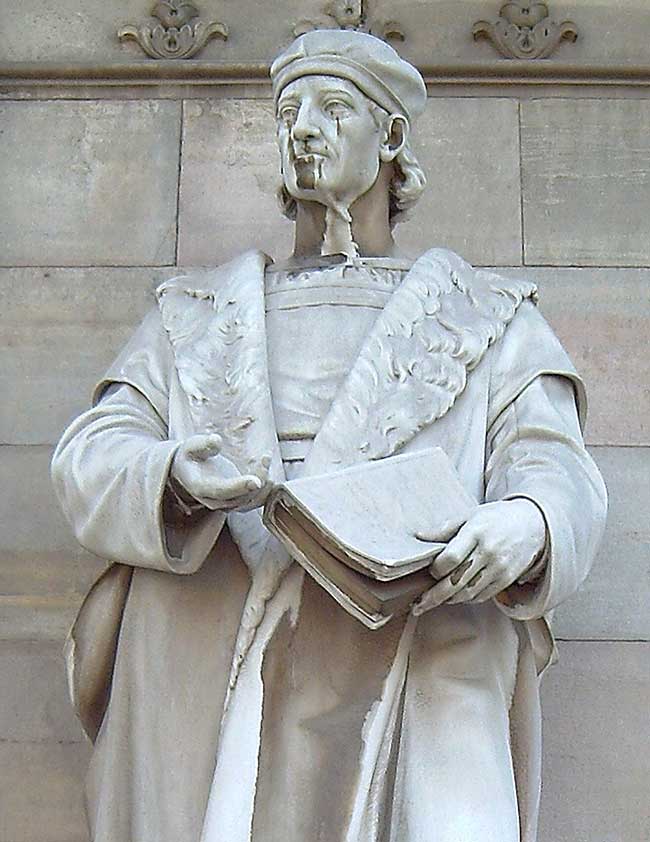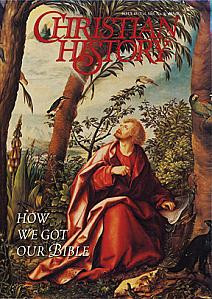NEBRIJA RISKED LIFE AND JOB FOR AN ACCURATE BIBLE

[Statue of Antonio de Nebrija (c.1441–1522) at the entrance of the National Library of Spain, in Madrid. Sculpted in Italian white marble by Anselmo Nogués García (1864–?) in 1892—Luis García from Madrid (Spain) / [CC BY-SA 2.0] Wikimedia]
ON THIS DAY, 18 AUGUST 1492, less than a week after Columbus sailed to discover the Americas for Europeans, Antonio de Nebrija published a Castillian grammar. This work marked a milestone, for it was the first grammar of a modern Romance language, and was soon imitated by many other nationalist scholars. In it Nebrija tried to establish a normative (standard) use of Spanish. He believed that languages rise, spread, and fall with empires and that language is a tool of conquest. Use of a standardized Spanish rather than dead languages would increase Spanish power and influence. In short, he wanted to place Spanish on a level with classical languages.
At first glance, Nebrija’s theories and accomplishments may seem to have little to do with Christian history. On the contrary, his life and work place him squarely in the Christian cross-currents of his day.
Born around 1444, Antonio de Lebrij came from a family of conversos, Jews who had converted to Christianity. Early in life he became interested in restoring Latin and the Latin classics. Like most Christian humanists, he Latinized his name. After acquiring a basic education in Spain, he left to study in Italy. Following several years in Bologna, he returned to Spain and worked for Bishop Fonseca in Seville before becoming a teacher of grammar and rhetoric at the University of Salamanca. His work on grammars and a Spanish/Latin dictionary not only inspired imitators in other nations but helped standardize Spanish forms and spelling at a time when Spain was about to develop an empire that spread its tongue around the world.
Nebrija’s Jewish background gave him an interest in Hebrew and in the accurate translation of the Jewish and Christian Scriptures. When he attempted to correct the Vulgate (the official Latin Bible of Roman Catholicism) he fell afoul of the Spanish Inquisitor Archbishop Deza of Seville who seized his papers and sentenced him for heresy:
The archbishop’s object was to deter me from writing. He wished to extinguish the knowledge of the two languages on which our religion depends; and I was condemned for impiety, because, being no divine but a mere grammarian, I presumed to treat of theological subjects.
He declared that he submitted his judgment to the will of Christ in the Scriptures but was told he had to reject as false what was clearly true. Thus his pursuit of truth and accurate scholarship threatened his good name and placed him in danger of excommunication and prison. “What tyranny! to hinder a man, under the most cruel pains, from saying what he thinks, though he express himself with the utmost respect for religion!” On what should he employ his thoughts, he asked, if not on Scripture?
Fortunately Deza’s successor, Cardinal Ximenez de Cisneros, was more reasonable. He restored Nebrija and employed him on a polyglot Bible he was sponsoring that would collate accurate translations of the Scriptures from several languages into parallel columns. Nebrija did not remain on the project long because he could not accept the cautious approach taken by the other scholars, overly influenced by the long-held but often-faulty Vulgate translation.
To the end of his life, Nebrija continued to work on linguistics, Bible studies, and other projects, including archaeological researches. He fashioned the chronicles of Hernando da Pulgar into a history of Ferdinand and Isabella. Along the way, he married and fathered seven children, which gave him both the knowledge and the incentive to write a book on educating youngsters; he emphasized parental responsibility. His daughter Francisca was so learned that contemporaries asserted she could substitute for her father in his classroom. Nebrija died in 1522.
—Dan Graves
----- ----- -----
Translation of the English language Bible also came with dangers. Learn more in Christian History #43, How We Got Our Bible






